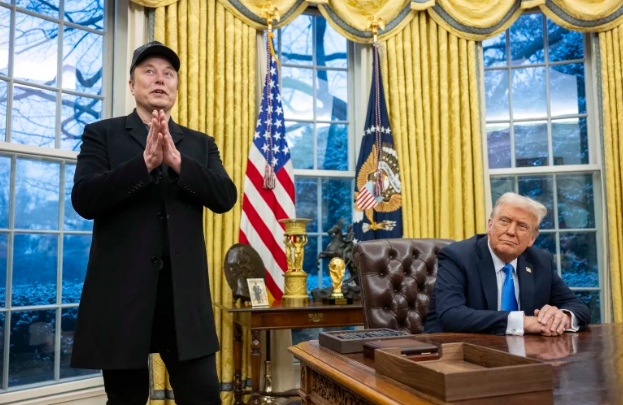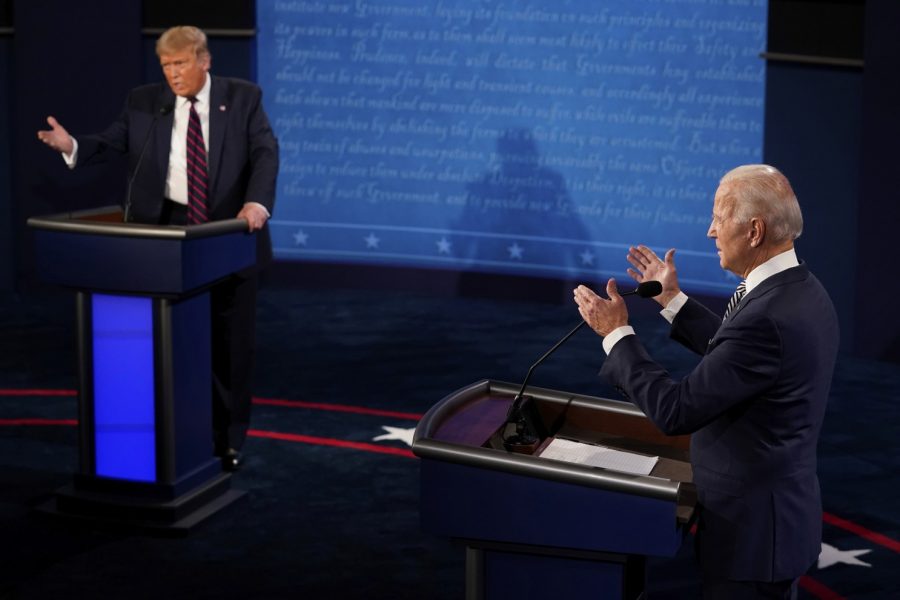Election Day Thoughts: Commentary on the Final Presidential Debate
Breaking Down the Facts
November 3, 2020
In these past months leading up to the election, I’ve found it hard to keep myself out of politics. With my seventeenth birthday just four days after election day, it is clear that I will not be able to cast my vote this year. However, this has not made me take the back seat on political issues. I find that it is very important for teenagers under the voting age to become politically active and knowledgeable. You do not just earn the right to have an opinion when you turn eighteen. My fellow peers, do not let any adult make you feel like that. No matter how old you are right now, we are all living through an exceptionally monumental presidential race. The outcome of this election will impact us all in years to come, no matter what candidate wins.
As someone who is just a year shy of voting, I want to provide my insight on the final presidential debate of 2020. I will start off with saying I am less than pleased with both presidential options. I will admit, I am biased, as I do have a preference for one candidate over the other. However, I have valid critiques for Joe Biden and Donald Trump. One thing that seems to be forgotten in the midst of the current political climate is that no party is perfect. In fact, no party is even CLOSE to being perfect. We need to hold all political leaders to the same high-standards. They are meant to serve the American people and advocate for our best interests. This is not always the case, and neither party is incapable of corruption. We can support political leaders, but we should never worship them. This goes for democrats and republicans alike. I may lean one way, but I have no problem intensely scrutinizing the candidate I have chosen to support in this election.
I watched both presidential debates, as well as the singular vice presidential debate. The final presidential debate, which took place last week on October 22nd, was the one I chose to write commentary on. I took notes, wrote down quotations from each candidate, and fact-checked many claims. I am going to give a brief rundown of a few talking points that stuck out to me: COVID-19, healthcare, and race in America.
The night started off with discussing the most pressing issue during this time: the fight against COVID-19. Trump started off with laying out the plan his administration has for the upcoming months. He claims that a vaccine could be available within just a few weeks. He did admit this is not definite, but nevertheless this was still a bold claim to make. Obviously, getting a vaccine is the most ideal situation, and the thought of this brings hope to the minds of many American people. Trump went on to explain how the military will distribute this vaccine, which I made great note of. This is an interesting claim, and I look forward to hearing more specific plans from Trump on what this would look like for America. However, Trump’s advisors had said previously before this debate that a vaccine wouldn’t be available until well into 2021. I feel that this is more realistic, but for the country’s sake, I hope Trump is correct.
Trump ended his opening statement saying that in regards to the pandemic, we are “rounding the corner”, and it will be over soon. Challenger Joe Biden did not agree with the claim that the pandemic is almost over in America. He stated that the USA is predicted to have around 200,000 more COVID related deaths before the end of 2020. This claim is valid, and the science does support it. When researching this claim myself, I found data directly from the Institute for Health Metrics and Evaluation. Their data shows that with current projection, the US could face an overall death toll of nearly 400,000 by February. Currently, the United States has around 225,000 deaths due to the Coronavirus. Daily cases of the virus in the week of the debate hit 70,000 in the United States for the first time since July.
While Biden’s statements seem more truthful when it comes to numbers, he lost some credibility when he brought up a comment Trump made in the past about calling the virus a “hoax.” Biden’s statement was misleading, as Trump’s comments were taken out of context. To be clear, Trump was referring to the Democrats’ criticism of his administration’s response to the pandemic and compared it to the “impeachment hoax.” He did not call the virus itself a hoax. This hoax claim is often used by the democrats, but my research has found this to be baseless. However, Trump has been guilty of providing other misleading statements to the public in regards to the virus.
This situation is similar to Trump’s claim that Biden called him xenophobic when he placed a travel ban on China. This comment from the former vice president was misinterpreted, though I understand why it was perceived in such a way. During a press conference in March, Biden used the word xenophobic in reaction to how Trump labeled the Coronavirus the “Chinese virus.” This use of the word xenophobic was not in reference to the travel ban itself. Biden did go on to tweet in that same month, “[b]anning all travel from Europe — or any other part of the world — will not stop [the Coronavirus].” Clearly Biden did oppose travel bans in March of this year, but he did not outright call it “xenophobic.” Besides these misinterpretations of statements, I felt that the coronavirus discussion was a solid start to the debate. Trump laid out his plan in regards to the vaccine, and Biden brought up the very real rising death toll.
On the topic of healthcare, it is very clear to me that both candidates do not have a great history when it comes to this matter. When Joe Biden was the vice president to Barack Obama, the Affordable Care Act was passed. Though this was a step in the right direction for healthcare reform, it fell short in many ways and was not a perfect solution. The Affordable Care Act ensures that people with preexisting conditions have coverage and lowers the costs of screenings and certain prescription drugs. However, the Affordable Care Act has raised premiums for people who already had health insurance. It is highly controversial for this reason, and serves as a valid wrench in Biden’s plan. Biden claims he will reform The Affordable Care Act if elected. If there is no longer the Affordable Care Act, he will form his own healthcare plan with a public option. He does not agree with his plan being referred to as “socialized medicine” as Trump described it as. Biden stated that there being a public option does not make it “socialized”, and that “healthcare is not a privilege, it’s a right.” Trump wants to completely get rid of The Affordable Care Act, and put his own health plan into effect. However, it has been four years and we still have the Affordable Care Act and have not seen a concrete healthcare plan from him. He did say he would make sure everyone would be able to keep their private insurance, and those who have preexisting conditions will still keep their health insurance.
Finally, I will go through the race relations in America portion of the debate. From my perspective, the division of race in America was Biden’s strongest topic in this debate. He acknowledged institutional racism in our country and shared some of his daughter’s experience as a social worker to build ethos on the topic. Trump was quick to bring up Biden’s large contribution to the 1994 crime bill to destroy that credibility, as this crime bill has been proven to disproportionately negatively affect minorities in low-income areas. But what I really liked hearing from Biden was how he acknowledged this, and even stated he wanted to fix these racial disparities that this crime bill contributed to. I believe that is what we deserve from our leaders at the very minimum. They recognize a struggling demographic, admit wrong doings, and say that they want to change this.
The most infamous line of the night from the final presidential debate was Trump claiming to have done more for African Americans than any president, with “the exception of maybe Abraham Lincoln.” This was an outrageous claim, considering a few past presidents we have had. Barack Obama was of course the first African American president ever, breaking down a major race barrier and becoming a major inspiration to all Americans, especially African Americans. He and his administration got America out of the 2008 recession and began the steady decrease of black unemployment rates. Lyndon B. Johnson signed the Civil Rights Act of 1968, pushing it forward after John F. Kennedy drafted it. This bill was a major turning point for equality in America. It prohibited discrimination in public places, provided for the integration of schools and other public facilities, and made employment discrimination illegal. The Civil Rights Act was the most impactful civil rights legislation since Reconstruction. Instead of making this claim, I wish Trump had told the America people what he planned on doing to improve race relations in America. It is true that African American unemployment has continued to decrease under Trump’s administration, but racial tensions and hate crimes have only continued to rise. This issue is embedded in America, and will not simply just go away if the president does not take action against this issue.
I could go on, analyzing many other aspects of this debate. There were many topics I did not get to analyze, but I would love to possibly go into those in future articles. This debate was far more informative than the first one. For the most part, viewers were able to get a sense of where each candidate stands and what their priorities are. With that being said, I know who I will be rooting for this election day. I would like to state again that I feel that both candidates and parties are far from perfect. The candidate that I feel represents me the best is still far from my ideal leader. But, overall I hope that the outcome of this election allows for a more progressive future in America.






























